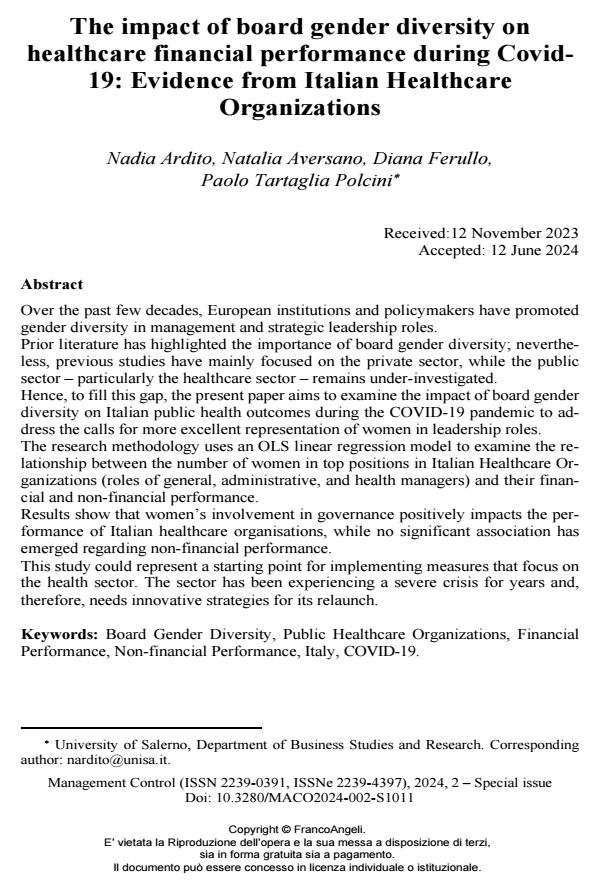The impact of board gender diversity on healthcare financial performance during Covid- 19: Evidence from Italian Healthcare Organizations
Titolo Rivista MANAGEMENT CONTROL
Autori/Curatori Nadia Ardito, Natalia Aversano, Diana Ferullo, Paolo Tartaglia Polcini
Anno di pubblicazione 2024 Fascicolo 2024/2 Suppl.
Lingua Inglese Numero pagine 23 P. 223-245 Dimensione file 254 KB
DOI 10.3280/MACO2024-002-S1011
Il DOI è il codice a barre della proprietà intellettuale: per saperne di più
clicca qui

FrancoAngeli è membro della Publishers International Linking Association, Inc (PILA), associazione indipendente e non profit per facilitare (attraverso i servizi tecnologici implementati da CrossRef.org) l’accesso degli studiosi ai contenuti digitali nelle pubblicazioni professionali e scientifiche.
Over the past few decades, European institutions and policymakers have promot-ed gender diversity in management and strategic leadership roles. Prior literature has highlighted the importance of board gender diversity; neverthe-less, previous studies have mainly focused on the private sector, while the public sector – particularly the healthcare sector – remains under-investigated. Hence, to fill this gap, the present paper aims to examine the impact of board gen-der diversity on Italian public health outcomes during the COVID-19 pandemic to address the calls for more excellent representation of women in leadership roles. The research methodology uses an OLS linear regression model to examine the re-lationship between the number of women in top positions in Italian Healthcare Or-ganizations (roles of general, administrative, and health managers) and their fi-nancial and non-financial performance. Results show that women’s involvement in governance positively impacts the per-formance of Italian healthcare organisations, while no significant association has emerged regarding non-financial performance. This study could represent a starting point for implementing measures that focus on the health sector. The sector has been experiencing a severe crisis for years and, therefore, needs innovative strategies for its relaunch.
Parole chiave:Board Gender Diversity, Public Healthcare Organizations, Financial Performance, Non-financial Performance, Italy, COVID-19.
- Efficiency determinants for higher education institutions: an empirical study of Italian public universities Angela Rella, María-Dolores Guillamón, Bernardino Benito, Filippo Vitolla, in International Journal of Productivity and Performance Management /2026 pp.108
DOI: 10.1108/IJPPM-09-2024-0649
Nadia Ardito, Natalia Aversano, Diana Ferullo, Paolo Tartaglia Polcini, The impact of board gender diversity on healthcare financial performance during Covid- 19: Evidence from Italian Healthcare Organizations in "MANAGEMENT CONTROL" 2 Suppl./2024, pp 223-245, DOI: 10.3280/MACO2024-002-S1011